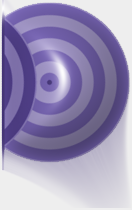Computer systems
Computer systems can be designed to isolate speech from background sounds as a step in the recognition processIncomplete
Material to be addedWeb sites for computational ASA (CASA)
McGill Psychology Department McGill Psychology Department
Auditory disorders
Some people with normal or near normal audiograms complain of not being able to understand voices when mixed with other sounds (i.e., they are deficient in ASA). Various types of cues are used to accomplish ASA. Damage to the auditory system may affect the use of different cues to different degrees. Tests based on scientific knowledge of ASA, could assess the patients' residual abilities to use specific kinds of cues for the segregation of signals. This may help in diagnosing the physiological basis of their disorders, and may also permit the fitting of hearing aids that maximize the remaining potential.
"Smart" hearing aids
"Smart" hearing aids may be provided for individuals who have difficulty in segregating concurrent sounds. Computers incorporated in these aids would enhance the ASA cues for segregation, such as spatial location, and allow listeners to use their remaining abilities to focus on individual sounds.
Workplace
Knowledge about ASA can contribute to workplace safety by aiding in the design of alarms and machine-status signals that will tend not to blend with each other or the background.
Auditory Display and Computer interfaces
In the emerging area of auditory display, in which numerical data are converted to sound patterns (rather than graphs) for examination, ASA principles can assist in designing sequences that will remain coherent and resist interference from other sounds. These principles can also be employed to create sound patterns used by computers to communicate with users, and to design recognition systems that will enable the computer to separate the voice of the user from background sounds.
The ICAD (International Community for Auditory Display) site has a lot of information on auditory display.
Music
Composers and musical theorists have a sound scientific basis.
INCOMPLETE: Material to be added


